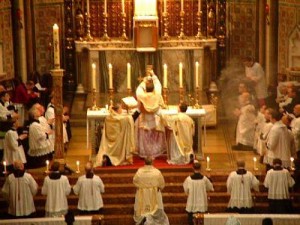 [1]What is the best way to teach the faith? This is a question that has been on the mind of many thinkers lately, especially in light of what Ralph Martin calls the “institutional collapse” [2] in American Catholicism. This question should be considered anew in light of recent research [3] into the behavior of young Catholics in America. According to Rod Dreher’s synopsis [4] of the research:
[1]What is the best way to teach the faith? This is a question that has been on the mind of many thinkers lately, especially in light of what Ralph Martin calls the “institutional collapse” [2] in American Catholicism. This question should be considered anew in light of recent research [3] into the behavior of young Catholics in America. According to Rod Dreher’s synopsis [4] of the research:
- They don’t understand their faith well enough to pass it on to any children they may have
- They believe that their own subjective beliefs and experiences are a more important arbiter of truth than the Church
- They pick and choose what they want to believe, discarding the parts that they dislike (e.g., in particular, teaching on sexuality)
- They are less involved with the Church as an institution (e.g., don’t go to mass as often), and feel more loosely tied to it than previous Catholic generations
- They tend to believe that the Catholic Church is just one church among others, with no special claim to the truth
- They affirm a Catholic identity, but reserve the right to define that as they want to; plus, they see their Catholicism not as being at the center of their identity, but one facet among others
- They are unable to articulate a coherent case for what it means to be Catholic
At this point you might be expecting the clichéd complaints about awful catechesis, our failure to form disciples, etc. All of this is true, but rather irrelevant. Yes, our catechesis is awful, and we don’t form disciples, but why? In contemporary Catholicism, our catechesis is awful because we are not using the best tool to instruct our faithful. We do not form disciples because we ignore the best tool of formation.
The tool that we are ignoring is the Sacred Liturgy. I don’t mean Mass Attendance or frequent reception of the sacraments. These things are important, but the liturgy uses a lot of tools to form us. A lot of the books and talks lately on evangelization and discipleship ignore (or downplay) the importance of the liturgy, and I think it is a shame. If we ever want to thrive, we Catholics need to think liturgically about every aspect of our faith.
The first step to thinking liturgically is to understand that the liturgy should be the primary instructor in our faith. How many of us actually think in these terms today? When we teach the faith to our kids, how often do we reference the rituals and prayers of the liturgy? When we hear the readings at Mass, how often do we try to connect them to the rest of the Propers? How often do we sit back and think about the ways Jesus encounters us during the liturgy?
That we have to ask these questions means we already know the answer. Is it any surprise that a lot of Catholics, especially of my generation, find today’s liturgies boring? It isn’t because “they don’t know” what is going on at Mass. Many Catholics are quite aware that at Mass, we receive Jesus Christ. We might even have some cursory notion of the Mass being a sacrifice. If we are really part of the in-crowd, we might even understand it is a propitiatory sacrifice. The problem isn’t knowledge.
The problem is people look at these things and then ask: why should I care? The liturgy is “the summit toward which the activity of the Church is directed.” (Sacrosanctum Concillium 10) Today, we Catholics can’t tell the faithful (to say nothing of non-Catholics!) why you should care about the one action which everything in the Church should build to.
This is contrary to the traditions of our fathers. When early Christians needed examples of how to live their faith in a society that wanted them dead, they didn’t start catechism classes scheduled at times families can’t participate with. They started establishing feast days commemorating those martyrs in the liturgy. Even before we had formal dogmatic pronouncements, people understood that Mary didn’t sin, why that mattered, etc. They understood this because the liturgy taught it to them. (Pius XI, Quas Primas) Pius XII wrote a lengthy encyclical [5] on how the liturgy forms the faithful, and its role as a teacher was heavily emphasized.
One of the great challenges to this type of thinking is that resources for a liturgically-centered faith formation are scarce. There’s a lot of interesting scholarship on the historical roots of the liturgy. There are also a lot of great commentaries on the Mass readings. (We at Catholic Lane offer [6] several [7]) Yet I think there are precious few resources available to Catholics that talk about the kind of things mentioned here.
Over the next few months, I hope to change that here at Catholic Lane. We will undertake a step by step journey through the various parts of Mass. Using Sacred Scripture, the Catechism and the Fathers, we will show how these parts of the Mass enrich our life with Christ, and what they teach us about learning and living our faith. Since this writer is a lover of the Extraordinary Form, we are going to start with that, but I don’t want the attendee of the Ordinary Form to be discouraged. A lot of the lessons you learn in one form of the Roman Rite are applicable to the other.
I hope you will join us on this journey to explain our faith through the liturgy.